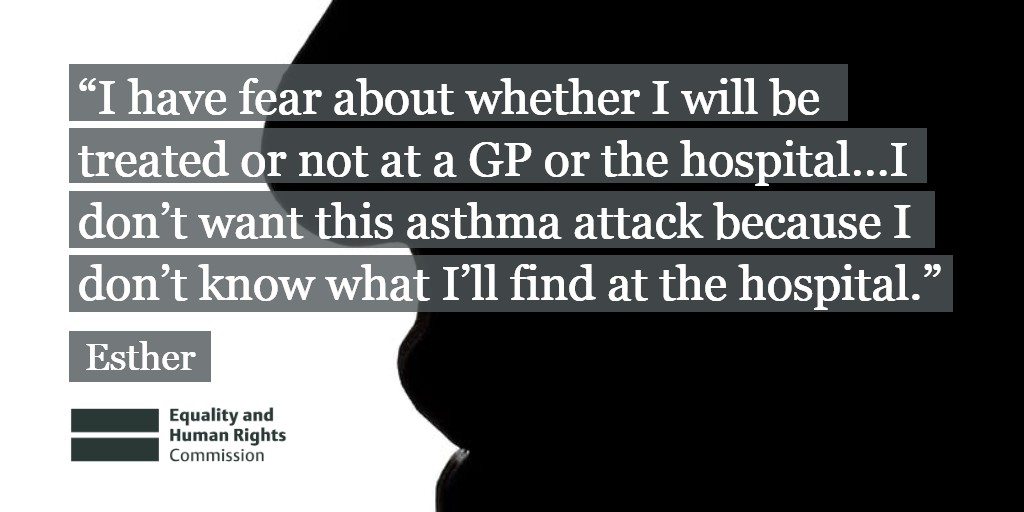The Equality and Human Rights Commission today published a ground-breaking report calling on the UK Government and healthcare providers to uphold equality and human rights obligations by facilitating access to healthcare services for all.
Their research reviewed existing evidence on the topic and explored the views of people who are or have been in the asylum process in Britain to identify the barriers they face to accessing healthcare and how these can be overcome. The research identified several pieces of policy and legislation that can negatively affect access to healthcare, including NHS charging policy in England, fear of data being shared with the Home Office, and the dispersal process, which disrupts continuity of healthcare and social networks that people rely upon. This had a more pronounced impact on pregnant women and disabled people.
The research found examples of people delaying or avoiding healthcare because of fear of what may happen if they sought treatment. The research also found that health professionals who lacked knowledge on rights and entitlements and how the healthcare system works for people in the asylum system created barriers to healthcare. Difficulties registering with a GP were widespread. There were several cases where eligibility checks for free secondary care delayed treatment or resulted in incorrectly refused treatment.
Both those receiving asylum support and those who are refused and not eligible for support live in a level of poverty that can be detrimental to their health, the report found. People reported that they had to choose between medicine and food and that they were unable to travel to appointments because they had no money for transport.
These findings strongly echo the experiences of many of the asylum seekers our partner organisations support up and down the country. The research also reflects the evidence we have gathered regarding the impact of charging, data sharing and other barriers to healthcare as part of our national campaign work to challenge the extension of NHS charging and our local advocacy to ensure local healthcare services meet the needs of people seeking asylum.
Welcome Recommendations for Change
We strongly endorse the recommendation to exempt all people who have been in the asylum process from NHS healthcare charging in England, in line with policy in Scotland, Wales and Northern Ireland. The recommendation to ‘put mechanisms in place to monitor and address any barriers to accessing healthcare services experienced by people who are or have been in the asylum process, such as instances of incorrect refusal of GP registration’ would do much to tackle the most common barriers to healthcare.
We also welcome the Commission’s recommendation to ensure a clear separation between immigration proceedings and the provision of healthcare services and would go further, calling for the damaging 2017 NHS Overseas Visitors Amendment Regulations to be withdrawn immediately; and full assurance should be given that charging will not be extended to any other services. We also call for a full-scale independent review of the 2015 NHS Charging regulations to be conducted, with particular focus on public health outcomes, the impact on vulnerable groups, and the cost effectiveness of charging regulations.
We welcome the Commission’s calls to address barriers to healthcare caused by other asylum policies. The Commission recommends the Government ‘review current Home Office accommodation and dispersal policy and practice to ensure that healthcare needs, especially of disabled people and pregnant women, are met in the provision of asylum accommodation.’ It further recommends the Government ‘ensure that people seeking asylum have the necessary financial resources to fully access healthcare services by: ensuring they are able to afford costs associated with making and attending relevant healthcare appointments, by either raising the level of financial support provided by the Home Office, or extending the right to work for people seeking asylum who have been waiting for a decision on their application for more than 6 months.’ This is in line with calls for change from the Lift the Ban coalition.
What You Can Do
Help disseminate the findings of the research, which is available at the following links:
- Recommendations: https://bit.ly/2Qk4jZg
- Evidence Review: https://bit.ly/2E3Xq8G
- Lived experiences: https://bit.ly/2FHJwKU
Share on social media using any of the following hashtags #AccessHealthcare #AsylumHealthcare #Healthcare and feel free to tag @EHRC, @DOTW_UK and @Imperialcollege.

